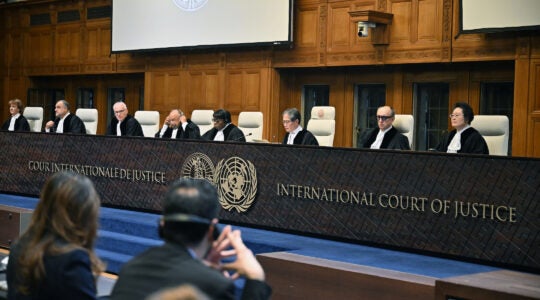BAQA AL-GHARBIYEH, Israel (JTA) – For Jalal Sawalha, Israel’s 60th anniversary is no reason to celebrate.
“I don’t feel like this is our country,” the young Arab Israeli said bitterly in the back of his family’s small convenience store on the winding main road of Baqa al-Gharbiyeh, a large Arab town just on the Israel side of the Green Line, which demarcates the boundary between Israel and the West Bank.
Swalha says it’s fine if Jews want to celebrate Israel’s Independence Day.
“It’s their lives, they can do what they want,” he said. “But it’s not part of our life.”
Standing behind the counter, Sawalha’s aunt, Enam Hamzi Ganaim, a journalist and poet wearing a headscarf and a long dress typical of observant Muslim women, has a different view.
“I have rights here, I think of this country as mine and I enjoy my life here,” she said. “I’m not celebrating, but I’m still Israeli.”
Their sentiments reflect the contradictions many Arab Israelis feel here as both citizens and outsiders 60 years after Israel was established as a Jewish state.
Reactions to this year’s planned 60th anniversary celebrations have highlighted some of the fundamental differences between Israel’s Arab and Jews, evoking complex questions of identity and clashing historical narratives.
In one of the more stark rebuffs to Israel, the country’s Committee of Arab Mayors called for a boycott of the celebrations. The mayors want to drive home the message that Israel’s establishment came at the expense of the Palestinian people – their people.
Palestinians, including many Arabs in Israel, commonly refer to Israel’s Independence Day as al Nakba – Arabic for “the catastrophe.”
For them, Israel’s independence constituted the national tragedy of defeat for the Arabs and the creation of hundreds of thousands of Arab refugees.
“There is more awareness now of our collective memory and an attempt by people to try to preserve it,” said Mohammed Amara, an Arab Israeli political scientist who lecturers at Israel’s Beit Berl College.
Avi Dichter, Israel’s public security minister, has asked the country’s Arab leadership to reconsider their planned boycott.
But his entreaties to the Israeli Arab population has not gone smoothly, especially following remarks he gave in Shfaram, the one Arab town whose mayor has agreed to hold festivities.
In Shfaram, Dichter reportedly said, “Those who sit year after year and cry about the Nakba shouldn’t be surprised if in the end they really do have a Nakba.”
Some Israeli Jews condemned the remarks.
“Only paranoia and a repressed feeling of guilt could produce the shocking sentence,” Ha’aretz columnist Meron Benvenisti wrote.
Benvenisti suggested that Dichter’s comments were reminiscent of the years of Israel’s military rule over its Arab minority from 1949 to 1967, when the government expected Arab compliance in return for promises of favors like paved roads and increased municipal budgets.
Trying to soften his message, Dichter said in the same remarks that Israel belonged to its Arabs and other minority groups as much as it belongs to the Jews. None of them “have any other country” but Israel to call home, he said.
Israel’s 1.3 million Arab citizens comprise about a fifth of the country’s population. Although technically equal under the law Israeli Arabs – also known as Palestinian Israelis – commonly face discrimination in areas ranging from jobs to housing and community development.
Israeli Jews are ambivalent about the country’s Arab population. Some decry their discrimination, but many view the country’s Arabs as a fifth column, disloyal to the state and a potential threat to its Jewish population. Israeli Arabs at times have been implicated in abetting terrorist attacks against Israeli Jews.
The boycott of this year’s Independence Day celebrations is of a piece with the newfound outspokenness of the Israeli Arab intelligentsia, members of which published a controversial document in 2006 calling for greater Arab power in the Jewish state.
The authors of that document, “The Future Vision of the Palestinian Arabs in Israel,” argued that Israel cannot be both a Jewish and democratic state, and they called for eliminating the Jewish character of the national anthem and flag.
One of those authors, Mohammed Marzouk, is the director of the Baqa al-Gharbiyeh branch of Shatil, a division of the New Israel Fund that counsels nonprofit organizations. Marzouk says Palestinian Israelis are graduating to a new level of political consciousness.
“In the past we would sing Independence Day songs and put up flags, but today we don’t do that,” he said. “People would be ashamed to do so.”
Marzouk is helping plan a week of local “Nakba” activities – commemorations that have gained currency among Israeli Arabs in the last decade. The schedule includes visits to the sites of villages destroyed during and after Israel’s 1948 War of Independence, workshops and lectures.
He said Israeli Arabs and Jews need to acknowledge each other’s histories if they are to build bridges of understanding.
“As long as Jewish citizens don’t acknowledge the grief, it will be hard for us to accept their independence,” Marzouk said.
For Madjy Abu-Mokh, 16, the contrasting approaches of his country’s planned celebrations and his community’s planned commemorations present a painful puzzle.
“I’m not sure what to think,” he told JTA. “I am an Arab, so I feel an obligation to take part in Nakba activities and need to know what happened. But on the other hand, I’m a citizen of this country.”
JTA has documented Jewish history in real-time for over a century. Keep our journalism strong by joining us in supporting independent, award-winning reporting.





